SPANISH PISTO MANCHEGO
Pisto Manchego is a full of color and veggies Mediterranean dish, easy to cook and perfectly paired with fried eggs or white rice. Spanish Pisto is “the Spanish Ratatouille” our full of fresh vegetables traditional recipe that will soon become your favorite comfort food for cold days.
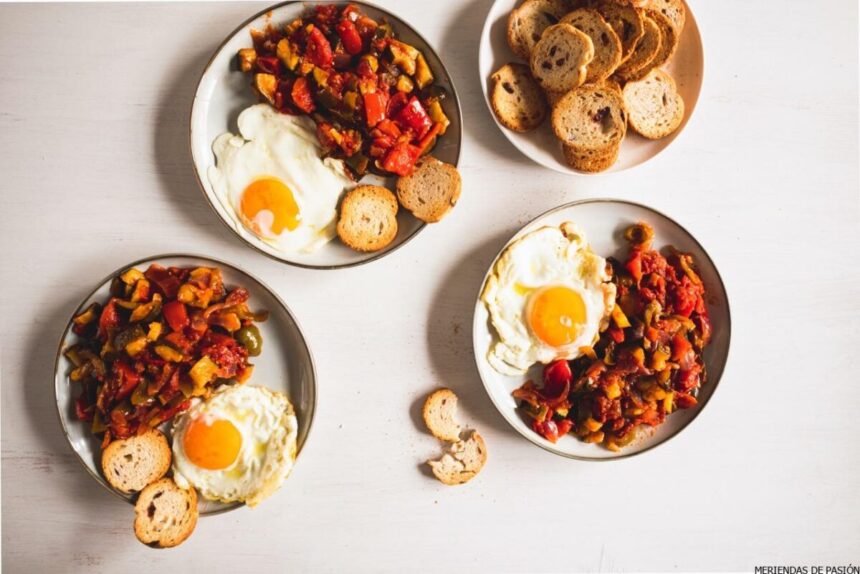
Could we consider Pisto Manchego a tapa?
Yes, of course you can serve a toast with your homemade pisto and a small quail egg on top.
The pisto tapa will soon become one of your favorite appetizers.
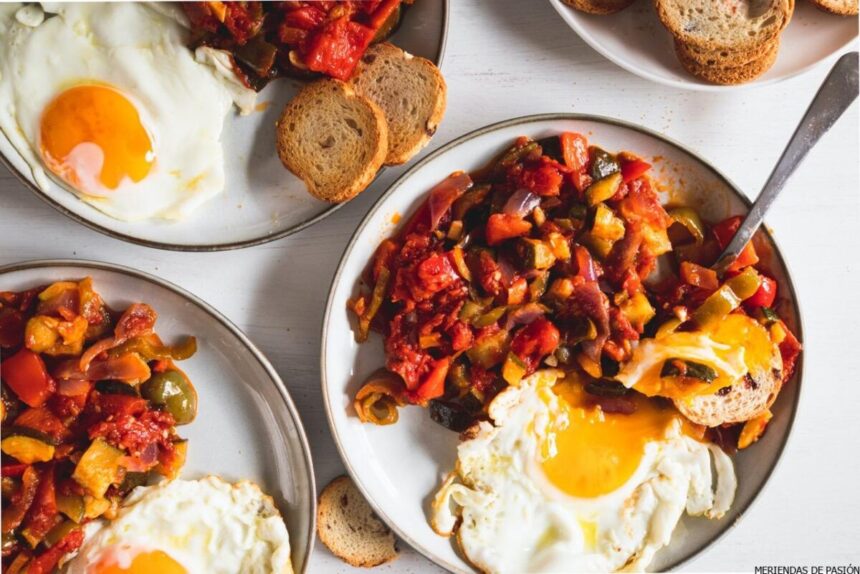
Spanish Pisto Manchego is often considered a Spanish Ratatouille recipe, made with fresh ingredients from the garden and a true comfort food.
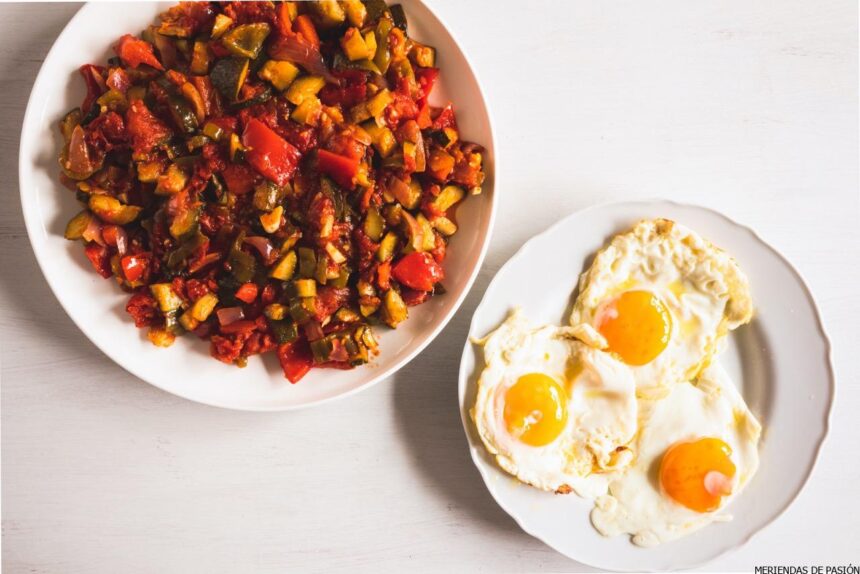
Pisto Manchego used to be a modest Spanish recipe that country workers cooked using seasonal vegetables they could find after working in the fields. There are many versions of this Spanish vegetable stew using a variety of vegetable but they always include tomatoes and bell peppers as the main ingredients.
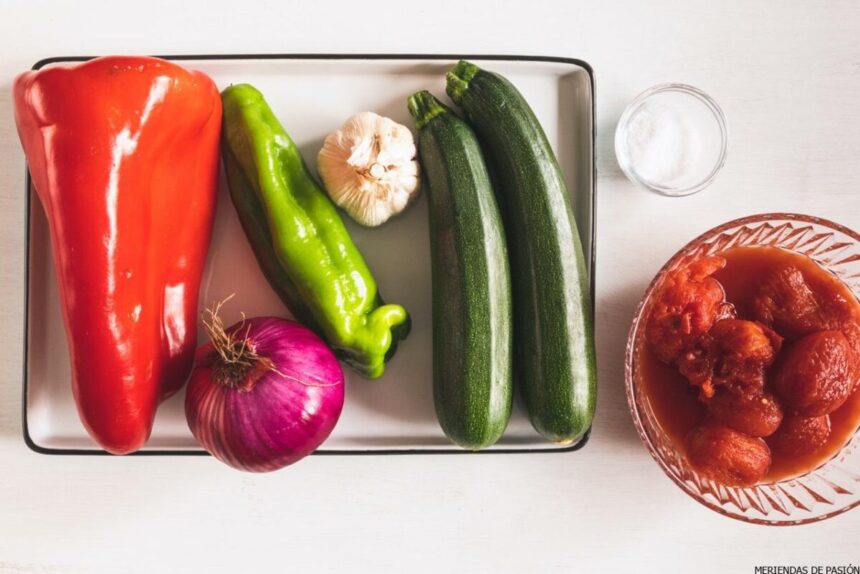
Pisto is originally from the regions of Murcia, Castilla La Mancha and Extremadura but nowadays it’s eaten all throughout Spain. Especially during Summer months when tomatoes and bell peppers are widely available.
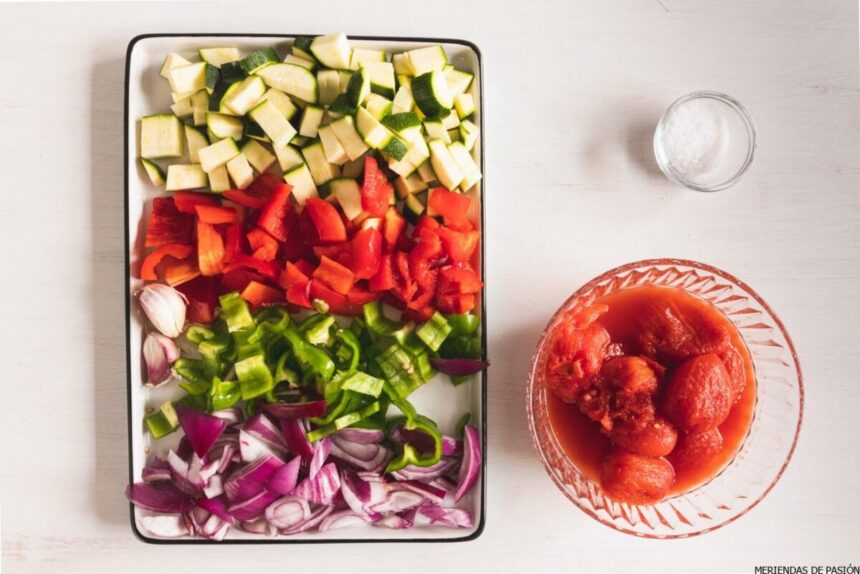
How to cook traditional Pisto Manchego?
When making this Spanish Pisto Manchego recipe patience will be your friend, is very important to slow cook your veggies. You want to cook it low and slow to achieve that amazing soft flavor paired with the olive oil that characterizes this dish.
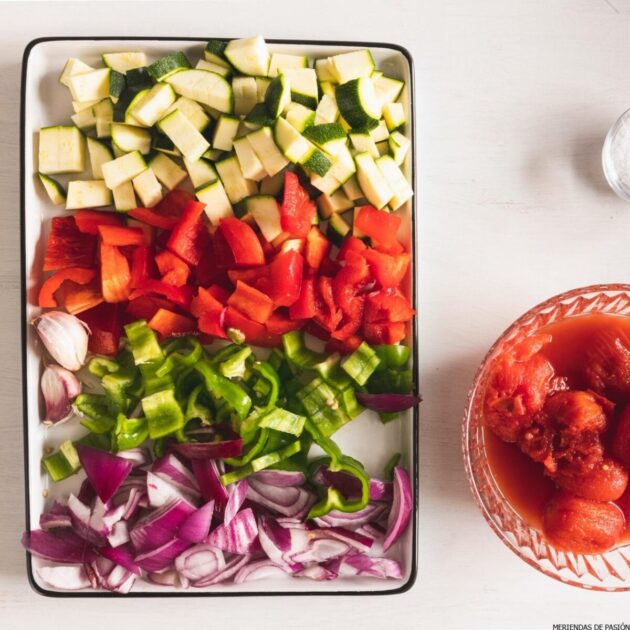
Best tomatoes to cook pisto manchego
The tomatoes in this recipe can either be fresh or store-bought.
We do recommend using fresh tomatoes of course, since a good Pisto Manchego recipe always consists of farm fresh vegetables, but tomatoes must be ripped and with juicy, like pear tomatoes (not the tomatoes you use for salad).
If you like to peel the tomatoes just immerse them in boiling water until the split starts opening up. Have a bowl of ice water close by and transfer them once they’re done. You can then start peeling them and then set aside.
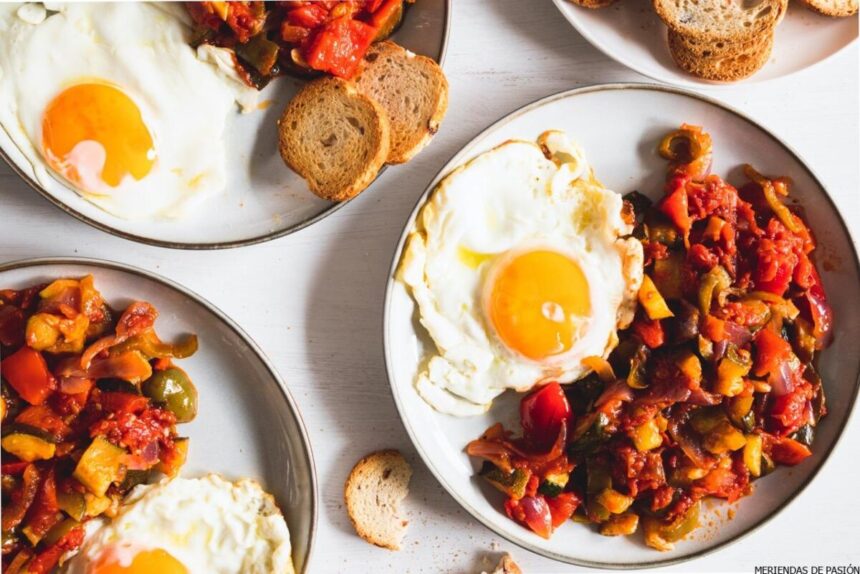
Extra Virgin Olive Oil in Spanish Cuisine
As you know Olive Oil is produced in Spain, and in many Mediterranean countries, so this healthy ingredient is very important in Spanish cuisine.
The extra-virgin olive oil (EVOO) is a flavor maker in the pesto recipe. Slow simmer your ripped tomatoes in extra virgin olive oil with a pinch of salt is one of the simplest and yummiest flavors in our cuisine.
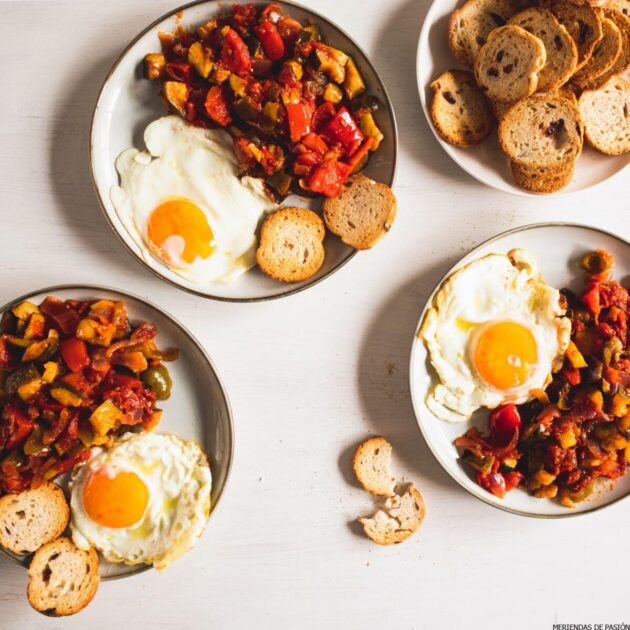
How to serve Pisto Manchego?
The most traditional way to serve pisto manchego is with freshly fried eggs and some french bread, but you can also add some Spanish jam to your post dish to make it ever tastier.
Another common dish is pisto with rice or with pasta, is always a good idea to add some veggies to your recipes have a nice pisto into your fridge to add to your favorite carbs.
Pisto with cod is also a typical Spanish dish, you must cook cod before adding the pisto and let it simmer.
Finally, adding some tuna or ground meet to your pisto can be a good filling to your favorite lasagna, why not?
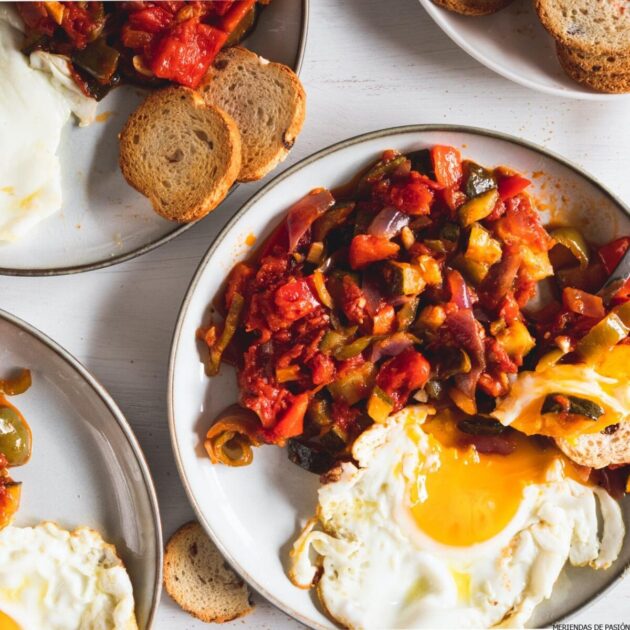
How to preserve pisto manchego?
You can freeze your pisto manchego once is cooked and add it to your favorite pasta or rice to add some veggies to your batch cooking options.
Spanish Pisto Manchego
Equipment
- 1 Frying pan
- 1 Cutting table
Ingredients
- 900 g Ripe tomatoes See note #1
- 3 units Medium zucchini
- 2 units Garlic cloves
- 1 unit Big red bell pepper
- 2 units Medium green bell peppers
- 1 unit Medium red onion
- Salt and pepper
- 120 ml Extra virgin olive oil See note #2
- Paprika powder
- 4 units Eggs
- 8 units Sliced bread
Instructions
- Peel your tomatoes by slicing a shallow X at the bottom of the tomatoes and immersing them in boiling water (see note #1)
- Once the split starts to open up transfer them to a bowl of ice water and start peeling and set aside.
- In the meantime, dice the peppers, zucchini, onion, and garlic.
- In a large pan on low-medium, heat 4 tablespoons of oil and cook the tomatoes for two minutes. Set aside.
- Add 2 4 more tablespoons of oil, add the zucchini, and cook until tender.
- Then add the garlic, bell peppers, and onion, and let them cook together until tender and soft.
- Once the vegetables are soft, add the tomatoes, season with salt, pepper, and paprika powder (optional) and let them slowly cook together for a few more minutes.
- n a pan, fry the eggs sunny side up and set aside. Toast your bread and set aside.
- Serve the Pisto Manchego with a fried egg and bread.
Notes
- Instead of fresh tomatoes you can also opt for storebought peeled tomatoes. Just make sure they have no added flavors.
- In Spain, extra-virgin olive oil is often used when cooking vegetables as its unprocessed and the purest form of olive oil. Feel free to use regular or organic olive oil instead.
Nutrition
Other Spanish recipes that could interest you
Comparte esta receta / Sharing is caring

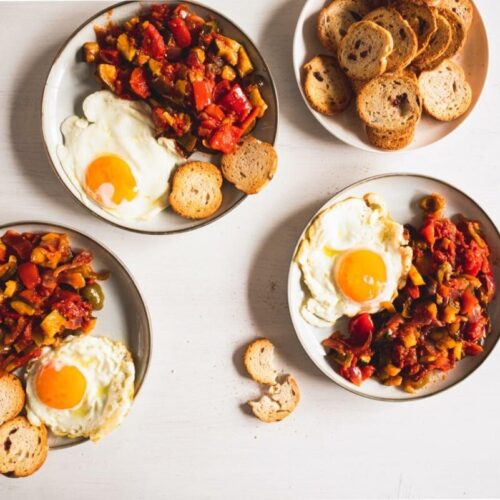

Adoro los sabores mediterráneos y esta receta de legumbres con el sabor del ajo, el aceite de oliva y la páprika es un deleite para cualquier paladar. Me encanta la sugerencia de acompañarla con un trozo de pan y huevos fritos. OLÉ!
Laura me gustó muchísimo esta receta de Pisto Manchego. Perfecta para un brunch!
El pisto manchego es una de esas elaboraciones que siempre tengo en la recámara para cuando no sabemos qué cocinar. Tanto de primer plato, como plato único o guarnición, siempre triunfa! una elaboración de 10!
Well done! I made it yesterday and served it with good eggs as shown on your post and it was scrumptious! I saved some on the freezer as you recommend so my mom can taste it next week.
Me encanta el pisto manchego, es algo que hacemos mucho en Andalucía. Lo llamamos simplemente pisto y es un básico de nuestra cocina y de nuestros sofritos. Un saludo bonita!!
Lo he preparado siguiendo tu receta y la verdad es que me ha quedado delicioso! Lo he servido como recomiendas, con unos huevos fritos y le ha gustado a toda la familia!
Soy de Murcia y doy fe que el pisto manchego es una auténtica delicia. Lo he hecho con huevos y unas costas como tú y nos ha encantado. También lo hago mucho para ponerlo sobre una masa tipo empanada a modo de coca de verduras y es un triunfo!
I love how you’ve shared the history and tradition behind Pisto Manchego—it’s such a comforting and versatile dish! Your step-by-step instructions make it so approachable, even for someone new to Spanish cuisine. It looks delicious. Can’t wait to try this recipe at home!